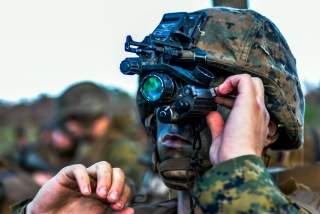How the United States Dominates the Battlefield: It Wins Wars at Night
Since night raids during World War II, the United States has maintained the advantage in the dark.
In the longer term, advancements will likely include giving a soldier the ability to magnify small areas of his field of view, Grove tells Task & Purpose. Take, for example, a scenario in which a soldier observes movement around a distant rock. The new technology would allow him to cue a high fidelity sensor to magnify the scene around the rock, observing it with extreme clarity and determining, for example, whether the object in question is is an orphan playing ball or an IED-planting insurgent.
There’s plenty more on the horizon, from ever higher fidelity NVDs to the ability to take and upload screengrabs. Separate sensors in NVDs will one day communicate with other devices, seamlessly providing a soldier with a stream of useful information. Military engineers are also working on exploiting “a region of the infrared spectrum” that will allow a helicopter pilot to see through sandy, brownout conditions.
And it could all come to him not through the bulky goggles today’s special operations forces are using, but a pair of shades. “The future form factor might be a sunglass,” Grove says, “where you have either a wireless or flexible conductor that allows you access a very small processor or power system on the back of the helmet.”
And beyond that? In 2014, researchers at the University of Michigan developed a light sensor so small it could be squeezed into a contact lens, allowing, at least in theory, for the creation of night-vision contacts. Grove is doubtful that engineers will be able to squeeze all of processing and display requirements into such a small device, but he’s not ruling out the possibility.
“With the amazing pace of innovation,” he says, “I have learned that you never say never.”
Adam K. Raymond is a writer and reporter in Louisville, Kentucky. Follow Adam K. Raymond on Twitter @adamkramond.
This article originally appeared at Task & Purpose. Follow Task & Purpose on Twitter.
More Articles from Task & Purpose:
-
Marine Corps Mechanic Injured By Lighting Declared Brain Dead
-
Which Parts Of The US Are Likeliest To Be Vaporized In A Russian Nuclear Attack?
Image: A U.S. Marine with Bravo Company, 1st Battalion, 23rd Marine Regiment, 4th Marine Division, adjusts a monocular night vision device in preparation for a patrol exercise at Barksdale Air Force Base, La., March 18, 2016. The night vision device was used to provide the user with enhanced visibility, facilitating detection of simulated threats during night time operations. (U.S. Air Force photo/Senior Airman Mozer O. Da Cunha).

